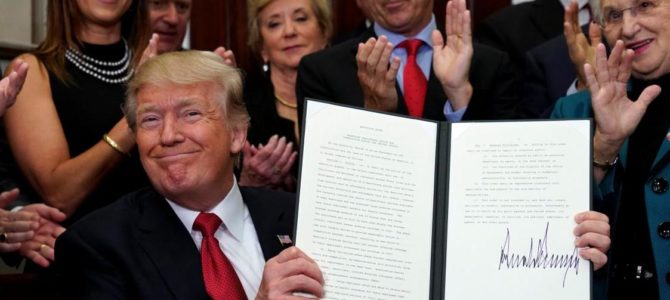A day after signing an executive order that offered a small break for consumers, we learned that the White House also plans on stopping the unconstitutional subsidy payments of Obamacare. You will now hear Democrats accusing the president of “sabotaging” the Affordable Care Act (ACA), when in reality, nothing has ever been quite as damaging to Obamacare as Obamacare itself. And the same people who lament the breaking of norms, the end of the constitutional democracy, and all the presidents tweets will now hypocritically demand that these unconstitutional payments continue.
For Democrats, following the law as written is now a crime against the law. But Obamacare, as you may recall, was implemented in lawlessness from the get-go. Nothing was more emblematic of this problem than the implementation of so-called “cost sharing reduction” payments, also called CSR subsidies, which are direct payments to insurance companies that were designed to hide the true cost of Obamacare by shifting cost to taxpayers while bribing insurance giants to participate in the law’s exchanges.
Shortly after the passage of Obamacare, the Obama administration realized that it would need these subsidies and asked for an appropriation from Congress in 2013. Why would it do so if it didn’t have to? No one knows. When Congress refused, Obama’s Treasury Secretary Jack Lew, without offering any public legal justification for the move, ordered the administration to begin making CSR payments. You can imagine the outcry if Donald Trump simply began funding a massive border wall without a congressional appropriation to authorize the funding.
Since Lew’s decision to unilaterally create a massive new appropriation, Obama (and now Trump) have been sending around $7 billion each year to insurance companies participating in the supposedly self-sufficient and competitive state health care exchanges. They continued to do so after the House sued. They continued to do so after a federal judge found the payments unconstitutional and ordered them stopped.
“Congress authorized reduced cost-sharing but did not appropriate monies for it,” U.S. District Court Judge Rosemary Collyer wrote. “Congress is the only source for such an appropriation, and no public money can be spent without one.”
In 2014, the Washington Post, after criticizing Republicans for their overall positioning on health care, wrote that “none of that excuses President Obama’s increasingly cavalier approach to picking and choosing how to enforce this law.” (The board must have forgotten their editorial position because this summer they, too, were using the “sabotaging” argument.)
The White House says that based on guidance from the Justice Department, the “Department of Health and Human Services has concluded that there is no appropriation for cost-sharing reduction payments to insurance companies under Obamacare.” As health care policy expert Chris Jacobs has noted, “By complying with the law and the Constitution to end the payments, President Trump actually diminished his executive power and ability to act unilaterally—restoring a rightful balance of power between the branches.”
“Democrats fearful of the implications of three more years of a Donald Trump in the White House have reason to thank him for so doing,” Jacobs wrote.
Democrats would thank him, of course, if they were actually concerned about checks and balances rather than merely worried about Donald Trump.
It’s worth noting that the price of insurance for Obamacare consumers will not change because of the president’s actions. Trump is stopping illegal payments to health insurance companies, not altering a word of Obamacare. Premiums will rise because Obamacare exchanges do not lower premiums, because they don’t feature any real competition. If you need insurance company bribes disguised as health care subsidies to keep your fabricated exchanges functioning, then perhaps you don’t have a law that’s worth saving. Plus, insurers began fleeing Obamacare “markets” long before Trump was ever elected. The collapse of the individual market was predictable, and ongoing. Even when everyone assumed Hillary Clinton would be president, a Kaiser Family Foundation study estimated that over 664 counties in the U.S. would feature only a single insurer on Obamacare exchanges in 2017.
In truth, Trump should have kept his promise to end these illegal subsidies immediately rather than waiting ten months to do so. Now the move looks like an act of negotiation leverage (which he probably thinks it is). Whatever the president’s reasoning, however, it’s good news for those who genuinely care about process and the most basic workings of the Constitution. If you don’t like it, write a better law.
David Harsanyi is author of the forthcoming “First Freedom: A Ride through America’s Enduring History with the Gun, From the Revolution to Today.”








